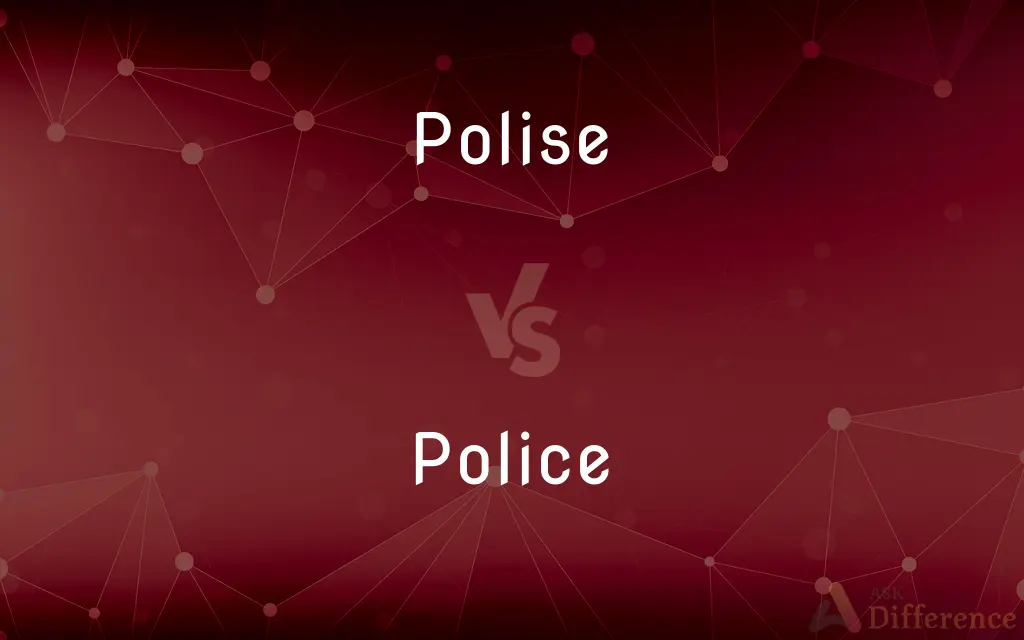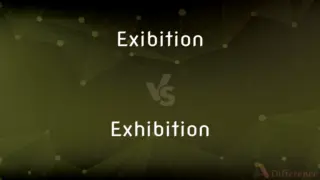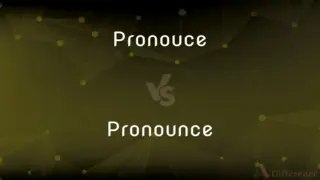Polise vs. Police — Which is Correct Spelling?
Edited by Tayyaba Rehman — By Fiza Rafique — Updated on March 25, 2024
"Polise" is an incorrect spelling, while "Police" refers to the organized civil force responsible for maintaining law and order.

Table of Contents
Which is correct: Polise or Police
How to spell Police?

Polise
Incorrect Spelling

Police
Correct Spelling
ADVERTISEMENT
Key Differences
"Polise" has an extra vowel which isn't needed; it's simply "Police".
Relate "Police" with "Policy" which many law enforcement agencies have.
Remember "ice" in "Police" which can be a mnemonic reminder of officers often being "cool" under pressure.
"Polise" looks and sounds like "Polish". If it sounds like you're cleaning, it's wrong.
In the word "Police", think of the "o" as the flashing lights and the "i" as the siren.
ADVERTISEMENT
How Do You Spell Police Correctly?
Incorrect: The polise arrested the suspect last night.
Correct: The police arrested the suspect last night.
Incorrect: The polise station is located in the center of the town.
Correct: The police station is located in the center of the town.
Incorrect: You should call the polise if you see anything suspicious.
Correct: You should call the police if you see anything suspicious.
Incorrect: He wants to become a polise officer when he grows up.
Correct: He wants to become a police officer when he grows up.
Incorrect: The polise are investigating the robbery.
Correct: The police are investigating the robbery.
Police Definitions
The act of keeping order or regulating a specified area.
The military was sent to police the border region.
An organized civil force responsible for maintaining law and order.
The police responded quickly to the emergency call.
A body of government employees trained in methods of law enforcement and crime prevention and detection and authorized to maintain the peace, safety, and order of the community.
A body of persons with a similar organization and function
Campus police. Also called police force.
(Archaic) Regulation and control of the affairs of a community, especially with respect to maintenance of order, law, health, morals, safety, and other matters affecting the public welfare.
(Informal) A group that admonishes, cautions, or reminds
Grammar police.
Fashion police.
The cleaning of a military base or other military area
Police of the barracks must be completed before inspection.
The soldiers assigned to a specified maintenance duty.
To regulate, control, or keep in order with a law enforcement agency or other official group.
To impose one's viewpoint or beliefs regarding, especially in an authoritarian way
Policing others' comments by implementing speech codes.
To critique in a presumptuous or arrogant manner
Policed the grammar of everyone who commented on the blog post.
To make (a military area, for example) neat in appearance
Policed the barracks.
A public agency charged with enforcing laws and maintaining public order, usually being granted special privileges to do so, particularly
Call the police!
A department of local (usually municipal) government responsible for general law enforcement.
The Sheriff's Department has jurisdiction across most of Chicago but focuses on the unincorporated area and tasks like prisoner transport, leaving the rest to the Chicago Police Department.
(UK) A branch of the Home Office responsible for general law enforcement within a specific territory.
Any of the formally enacted law enforcement agencies at various levels of government.
The staff of such a department or agency, particularly its officers; an individual police officer.
People who try to enforce norms or standards as if granted authority similar to the police.
Who called the fashion police?
Cleanup of a military facility, as a formal duty.
Synonym of administration, the regulation of a community or society.
(obsolete) policy.
(obsolete) polity, civilization, a regulated community.
(transitive) To enforce the law and keep order among (a group).
Extra security was hired to police the crowd at the big game.
To clean up an area.
To enforce norms or standards upon.
To police a person's identity
A judicial and executive system, for the government of a city, town, or district, for the preservation of rights, order, cleanliness, health, etc., and for the enforcement of the laws and prevention of crime; the administration of the laws and regulations of a city, incorporated town, or borough.
That which concerns the order of the community; the internal regulation of a state.
The organized body of civil officers in a city, town, or district, whose particular duties are the preservation of good order, the prevention and detection of crime, and the enforcement of the laws.
Military police, the body of soldiers detailed to preserve civil order and attend to sanitary arrangements in a camp or garrison.
The cleaning of a camp or garrison, or the state a camp as to cleanliness.
To keep in order by police.
To make clean; as, to police a camp.
The force of policemen and officers;
The law came looking for him
Maintain the security of by carrying out a control
Officers of a law enforcement agency.
She joined the police after graduating from the academy.
To control, regulate, or keep order.
They were asked to police their own event.
The department or building related to law enforcement activities.
He went to the police station to file a report.
Police Meaning in a Sentence
Witnesses are asked to contact the police with any information.
The police arrived at the scene within minutes.
The police are conducting a search for the missing child.
A police helicopter was used to track the suspects' car.
The police chief announced a new safety initiative.
She reported the theft to the police immediately.
A police detective specializes in solving crimes.
The police car flashed its lights to signal an emergency.
The police officer directed the traffic smoothly.
Police are warning residents about a recent spree of burglaries.
The police dog played a crucial role in the drug bust.
The police are investigating a cybercrime incident.
A police van was parked outside the courthouse.
The local police department held a community meeting.
The police have set up a hotline for tips.
Police officers testified about the evidence at the trial.
The police are looking into several leads in the case.
Police records show a decrease in crime rates.
The police are working to improve community relations.
The police are patrolling the neighborhood more frequently.
Police barricades were set up for the parade.
The police academy trains recruits rigorously.
Police officers must wear their uniforms while on duty.
Police issued a statement regarding the investigation.
The police escorted the dignitaries during their visit.
Police Idioms & Phrases
To police oneself
To regulate or control one's actions carefully.
It's important for the team to police themselves to maintain discipline.
Police the area
To monitor or patrol an area to enforce rules or laws.
The security team will police the area during the event.
Call the police
To contact law enforcement for help in a situation.
If you hear a disturbance outside, don't hesitate to call the police.
Common Curiosities
What is the root word of Police?
Derived from the Latin word "politia".
What is the verb form of Police?
"Police" is both a noun and a verb. To "police" means to regulate or control.
Why is it called Police?
Derived from the Latin "politia" meaning "civil administration."
What is the pronunciation of Police?
Pronounced as "puh-LEES".
Which vowel is used before Police?
"The" or "a", as in "the police" or "a police officer."
Which article is used with Police?
"The", as in "the police."
Which preposition is used with Police?
"By" or "of", as in "arrested by the police" or "a member of the police."
Is Police an adverb?
No.
What is the plural form of Police?
"Police" is both singular and plural. "Policemen" or "policewomen" can be plural forms for male and female officers, respectively.
Is Police a negative or positive word?
Neutral.
Is Police a collective noun?
Yes, when referring to the force as a whole.
What is the singular form of Police?
"Police" can be singular or plural.
Is Police a vowel or consonant?
Police is a word containing both vowels and consonants.
Is Police a countable noun?
No, but "police officer" is.
Is the Police term a metaphor?
No, but it can be used metaphorically in some contexts.
What is a stressed syllable in Police?
The second syllable, "lice".
What is the first form of Police?
"Police" as a verb.
Which conjunction is used with Police?
Standard conjunctions like "and" or "but" can be used.
Is the word Police imperative?
No.
Is Police a noun or adjective?
Noun.
How many syllables are in Police?
Two syllables.
What part of speech is Police?
Noun or verb, depending on usage.
Which determiner is used with Police?
"The" or "a", depending on the context.
Is Police an abstract noun?
No.
Is the word Police a gerund?
No.
How do we divide Police into syllables?
Po-lice.
What is the opposite of Police?
There isn't a direct opposite, but in certain contexts, "criminal" or "offender" could contrast.
What is the second form of Police?
"Policed."
How is Police used in a sentence?
"The police are investigating the incident."
Is the word “Police” a Direct object or an Indirect object?
It can be a direct object, as in "I called the police."
What is another term for Police?
Law enforcement.
What is the third form of Police?
"Policed."
Share Your Discovery

Previous Comparison
Exibition vs. Exhibition
Next Comparison
Pronouce vs. PronounceAuthor Spotlight
Written by
Fiza RafiqueFiza Rafique is a skilled content writer at AskDifference.com, where she meticulously refines and enhances written pieces. Drawing from her vast editorial expertise, Fiza ensures clarity, accuracy, and precision in every article. Passionate about language, she continually seeks to elevate the quality of content for readers worldwide.
Edited by
Tayyaba RehmanTayyaba Rehman is a distinguished writer, currently serving as a primary contributor to askdifference.com. As a researcher in semantics and etymology, Tayyaba's passion for the complexity of languages and their distinctions has found a perfect home on the platform. Tayyaba delves into the intricacies of language, distinguishing between commonly confused words and phrases, thereby providing clarity for readers worldwide.


































